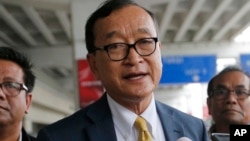Senior Cambodian general Ith Sarath thanked a visiting Thai military official on Wednesday, during a meeting in Phnom Penh, for blocking opposition leader Sam Rainsy’s planned return to Cambodia through Thailand in early November.
Sam Rainsy had announced that he would return to Cambodia on November 9 along with “hundreds of thousands” of migrant workers, using the land border at Poipet in Banteay Meanchey province. However, he was denied entry into Thailand and other attempts to reach Cambodia along with his Cambodia National Rescue Party colleagues were blocked by neighboring ASEAN nations.
Gen. Ith Sarath, chief of joint staff for the Royal Cambodian Armed Forces (RCAF), thanked visiting Lt. Gen. Piroach Vilailug, chief of the Royal Thai Armed Forces’ Department of Border Affairs, for cooperating with government to block “extremist” forces from entering the country.
“In fact, he [Ith Sarath] thanked Thailand for obstructing the forces of the extremists,” said Major General Thong Solimo, spokesperson for RCAF.
“It is normal as a matter of ASEAN principles of non-interference and for not providing a base for rebels and opposition groups acting against another country,” he added.
Shortly after Sam Rainsy’s announcement in August, Laos and Vietnam said they would refuse him entry, leaving the opposition leader with the option of using Thailand to cross the border.
Radio Free Asia also reported in early November that the Secretariat of Civil Aviation announced that airlines would face legal consequences if they allowed Sam Rainsy to board a flight.
In an email, Sam Rainsy said he expected officials from Cambodia and Thailand to have more substantive discussion during meetings, especially on critical issues like the economy.
“In the relations between Cambodia and Thailand, there are more important themes to discuss – revolving around the economic and social development of the two countries – than [discussing the] blocking of Sam Rainsy,” he told VOA Khmer in an email.
Sek Sophal, a researcher with Japan’s Ritsumeikan Center for Asia Pacific Studies, said that Thailand probably saw no gain in allowing the Cambodian opposition to use the Thai border to return to Phnom Penh.
“Maintaining stability with the neighboring countries, including Cambodia, is a strategy of choice, so that the Thai government can fully pay attention to its long-standing, troubling domestic politics,” said Sek Sophal, in a social media message.
He added that senior Thai government leaders were from the once powerful Eastern Tiger clique of the Thailand military establishment that had for decades maintained personal relationships with Cambodia’s military and political elite.
Thailand has routinely heeded to requests from Phnom Penh to deport or return Cambodians accused of allegedly breaking the law. Bangkok is also normally the first destination for Cambodians facing persecution and looking to leave the country.
In the past, Thailand has deported Sam Sokha, a Kampong Speu resident, for throwing a shoe at a Cambodian People’s Party billboard featuring an image of Prime Minister Hun Sen. Media fixer Rath Rott Mony fled to Thailand in 2018 after assisting on a RT documentary about alleged child sex trafficking in Phnom Penh. He was sent back by Thai officials at the request of the Cambodian authorities.
A number of CNRP members are also in hiding in Thailand, after the party was dissolved in 2017, and all its commune-level positions were taken over almost completely by the ruling party.
Phil Robertson, Human Rights Watch’s Deputy Director for Asia, said an increasingly authoritarian government in Thailand, following the military coup of 2014, had provided “dirty deals” with Cambodia to send people back on politically-motivated charges.
“This is a shameful reversal of Thailand’s historical role as a refuge for those fleeing oppression and it will cause huge problems for those fleeing PM Hun Sen’s abuses,” he said.
Thailand’s Foreign Ministry spokesperson Busadee Santipitak declined to comment Thursday evening, saying she was unaware of the issue.




